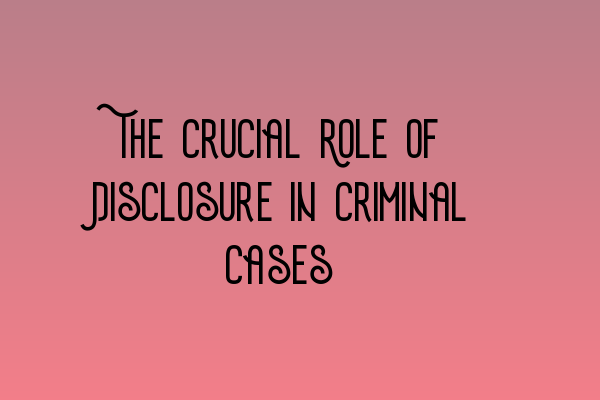The Crucial Role of Disclosure in Criminal Cases
Welcome to the SQE Criminal Law & Practice Law UK blog! Today, we will be discussing the crucial role of disclosure in criminal cases and why it is essential for both prosecutors and defendants.
What is Disclosure?
Disclosure is the process of providing relevant information and evidence to the opposing party in a criminal case. It is a fundamental principle of the criminal justice system that ensures both the prosecution and the defense have access to all the necessary material to make informed decisions and present their cases effectively.
Importance of Disclosure
Disclosure plays a critical role in criminal cases as it promotes fairness, transparency, and the right to a fair trial. It allows both parties to understand the strengths and weaknesses of each other’s cases, identify potential flaws in evidence, and make informed decisions regarding plea bargains or trial strategies.
For the prosecution, disclosure enables them to present a strong case by ensuring all relevant evidence, including witness statements, forensic reports, and expert opinions, are provided to the defense. This ensures that the defendant’s right to a fair trial is respected and reduces the risk of wrongful convictions.
On the other hand, disclosure is equally important for the defense as it allows them to carefully review the evidence against their client and identify any inconsistencies or weaknesses. It provides an opportunity for the defense to challenge the prosecution’s case and present a robust defense strategy, which is essential to protect the rights of the accused.
Types of Disclosure
There are two main types of disclosure: initial disclosure and continuing disclosure.
Initial Disclosure involves the early provision of key documents and evidence by both parties. This includes the defendant’s criminal record, witness statements, and any other material that may be central to the case. It ensures that both sides have a clear understanding of the evidence that will be presented during trial.
Continuing Disclosure, also known as ‘ongoing duty to disclose,’ requires both parties to disclose any additional evidence or information that may arise during the course of the case. This ensures that the trial remains fair and that any new material that could impact the outcome is addressed.
Consequences of Failure to Disclose
Failing to comply with the duty of disclosure can have serious consequences for both parties involved in a criminal case. For the prosecution, failure to disclose relevant evidence may lead to a miscarriage of justice and potentially result in the case being dismissed or overturned on appeal.
For the defense, inadequate disclosure can severely impact their ability to present a proper defense and may violate the defendant’s right to a fair trial. In some cases, failure to disclose favorable evidence may be considered a breach of the defendant’s right to disclosure and could lead to legal remedies such as adjournments, sanctions, or even a mistrial.
Conclusion
In conclusion, disclosure plays a crucial role in criminal cases as it ensures fairness, transparency, and the right to a fair trial. It enables both the prosecution and the defense to fully understand the strengths and weaknesses of each other’s cases, identify flaws in evidence, and make informed decisions.
At SQE Criminal Law & Practice Law UK, we understand the significance of disclosure in criminal cases. Our team of expert solicitors is dedicated to ensuring that our clients receive proper disclosure and are able to present a strong defense. Contact us today to learn more about our SQE 1 Preparation Courses and SQE 2 Preparation Courses.
